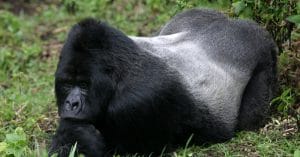The management of the Virunga National Park (PNVI) in the East of the Democratic Republic of Congo (DRC) has recently granted a three-month delay to the local populations for the harvest of food crops. This clemency measure, intended to overcome the Coronavirus health crisis, is however conditional on the behaviour of the indigenous people. They will have to prove they have the right to enter Africa's oldest natural park, which celebrated its 95th anniversary on April 21, 2020.
It is good news for the inhabitants of the Mayangose village located some 40 kilometres from the town of Beni, in the east of the Democratic Republic of Congo. These farmers are able to harvest food in the cultivated areas of the Virunga National Park (PNVI), from where they were expelled in 2005 for conservation reasons.
The decision was taken on 21 April 2020 by the Congolese Institute for the Conservation of Nature (ICCN), which is responsible for the management of the PNVI. It aims to provide the park’s residents with food to enable them to overcome the containment measures due to the Coronavirus pandemic. Consequently, close to 20,000 families who owned the fields inside the park will have three months to get there (from April 27 to July 26, 2020). Access to the park will be controlled by rangers. Each farmer will be required to register and deposit identification against an access token that they will hand out upon leaving the park in order to retrieve their identification.
In addition, any attempt to damage the fence, biodiversity or physical aggression against ICCN guards or staff will result in the immediate suspension of the pardon measure.
The oldest natural park in Africa is 95 years old
 The announcement date of parc’s pardon to residents coincided with its 95th birthday. This may be one way for Africa’s oldest nature park to commune with its residents, although they continue to claim their ancestral lands within the park’s boundaries.
The announcement date of parc’s pardon to residents coincided with its 95th birthday. This may be one way for Africa’s oldest nature park to commune with its residents, although they continue to claim their ancestral lands within the park’s boundaries.
Virunga National Park, formerly Albert Park, was created in 1925 by King Albert I of Belgium to protect the mountain gorillas living in the forests of the Virunga Massif. Thanks to these mountain gorilla families, rich biodiversity and spectacular landscapes, the park was ranked in the Top 20 best tourist destinations in the world in 2016 by the American newspaper “New York Times”.
Boris Ngounou








You must be logged in to post a comment.